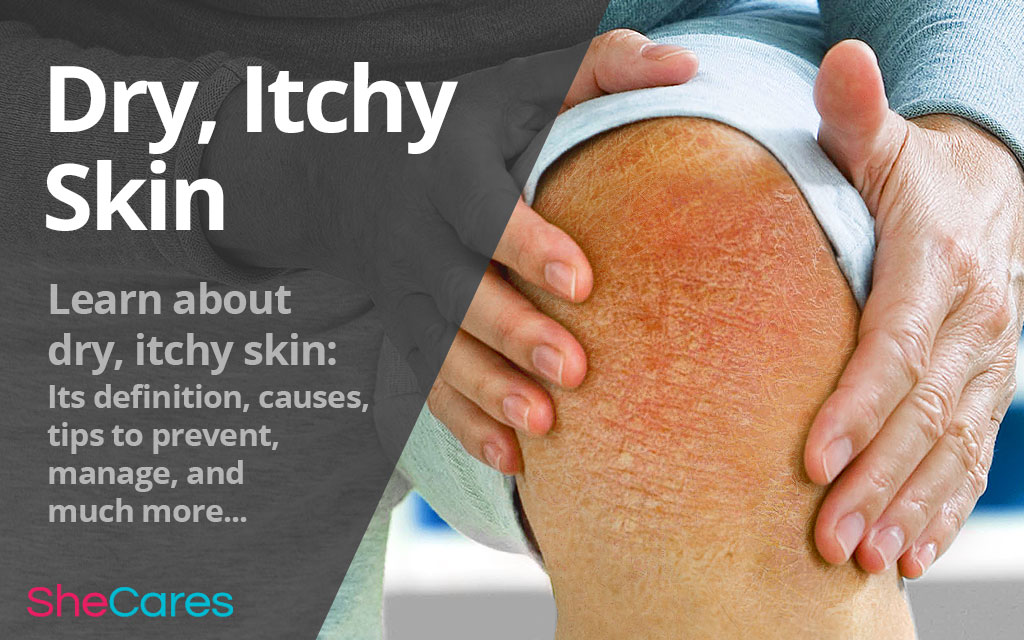For many women, winter is the season of dry, itchy skin - but for many other women, skin can be itchy, dry, and irritating year-round. Suffering from dry itchy skin can be frustrating and can sometimes even be distracting from daily tasks and chores. Learn more about dry, itchy skin as well as its causes and treatments.
About Dry, Itchy Skin
Usually, when skin becomes dry, it also becomes very itchy. This is because the itch is a way of the skin signaling to the brain that something is wrong and needs to be fixed - moisture is necessary for the good health of the skin, so when the skin doesn't have enough of it, it begins to itch.
Dry skin often goes along with scaly, rough, or flaky skin. A lack of moisture changes how skin cells grow and die, which changes the appearance and often the feel of the skin.
Causes of Dry, Itchy Skin
Understanding what has caused the dry, itchy skin can be the beginning of understanding how to heal the skin. Often, dry skin is caused by one of the following factors or a combination of them.
Changes in hormone levels
When estrogen levels in the body decrease - as they often do during menopause, for example - it also lowers levels of collagen in the body. Collagen is needed to produce strong, healthy skin that can absorb the proper amount of moisture and grow correctly. Without enough collagen, the skin is likely to dry out faster and more easily.
Temperature and weather changes
Winter is one of the most common causes of dry skin because it brings a drastic change in the temperature - which can affect the skin - and the heating inside most homes and buildings dries out the air. When the air is dry, skin is more likely to lose moisture.
Contact irritation
There are many different things that can irritate the skin when they come into contact with it. These may be harsh chemicals, or they may be otherwise harmless materials that simply cannot be tolerated by certain people's skin. When there is something that your skin is irritated by, it is likely to become dry and itchy if it comes into contact with the irritant.
Skin conditions
Several chronic skin conditions can cause damage to the skin, eczema being the most prominent. Most of the time, the damage that these conditions cause results in the skin becoming dry and itchy.
Tips to Prevent Dry, Itchy Skin
The first way to treat dry, itchy skin is to try to prevent it from becoming a problem in the first place. For women prone to dry, itchy skin, these methods are useful in preventing the problem from flaring up. Even if your skin has already become dry and itchy, trying to prevent the problem from worsening can save you from even worse itching later on. Prevention methods include:
- Beginning a moisturizing routine
- Taking lukewarm, not hot showers
- Avoiding extreme changes in temperature
Managing Dry, Itchy Skin
If these prevention methods do not keep the dry skin from appearing or recurring, there are also several simple lifestyle changes and natural remedies that can help to soothe dry skin. These are:
- Applying ice or cold compresses to the skin
- Bathing in oatmeal (i, e; or using a poultice)
- Buying a humidifier for your home
- Using fragrance-free lotion
If the itchiness of your skin lasts for more than two weeks, or if it causes extreme discomfort and interferes with your ability to sleep, you should consult a doctor. Another reason to see a doctor is if these natural remedies provide no relief. A medical professional can examine your skin to determine the underlying cause, and they can help find a treatment regimen that works, possibly using medicated creams for relief. Read more about how to treat and manage itchy skin of all types.
Sources
- American Academy of Dermatology. (2017). How to relieve itchy skin. Retrieved May 10, 2017, from https://www.aad.org/public/skin-hair-nails/skin-care/itchy-skin
- Mayo Clinic. (2016). Itchy skin (pruritus) Self-management. Retrieved May 10, 2017, from http://www.mayoclinic.org/diseases-conditions/itchy-skin/manage/ptc-20262951
- Mayo Clinic. (2016). Itchy skin (pruritus) Symptoms and causes. Retrieved May 10, 2017, from http://www.mayoclinic.org/diseases-conditions/itchy-skin/symptoms-causes/dxc-20262871
- Shah, M.G. & Maibach, H.I. (2001). Estrogen and skin. An overview. American Journal of Clinical Dermatology, 2(3), 143-150. Retrieved from https://www.ncbi.nlm.nih.gov/pubmed/11705091
